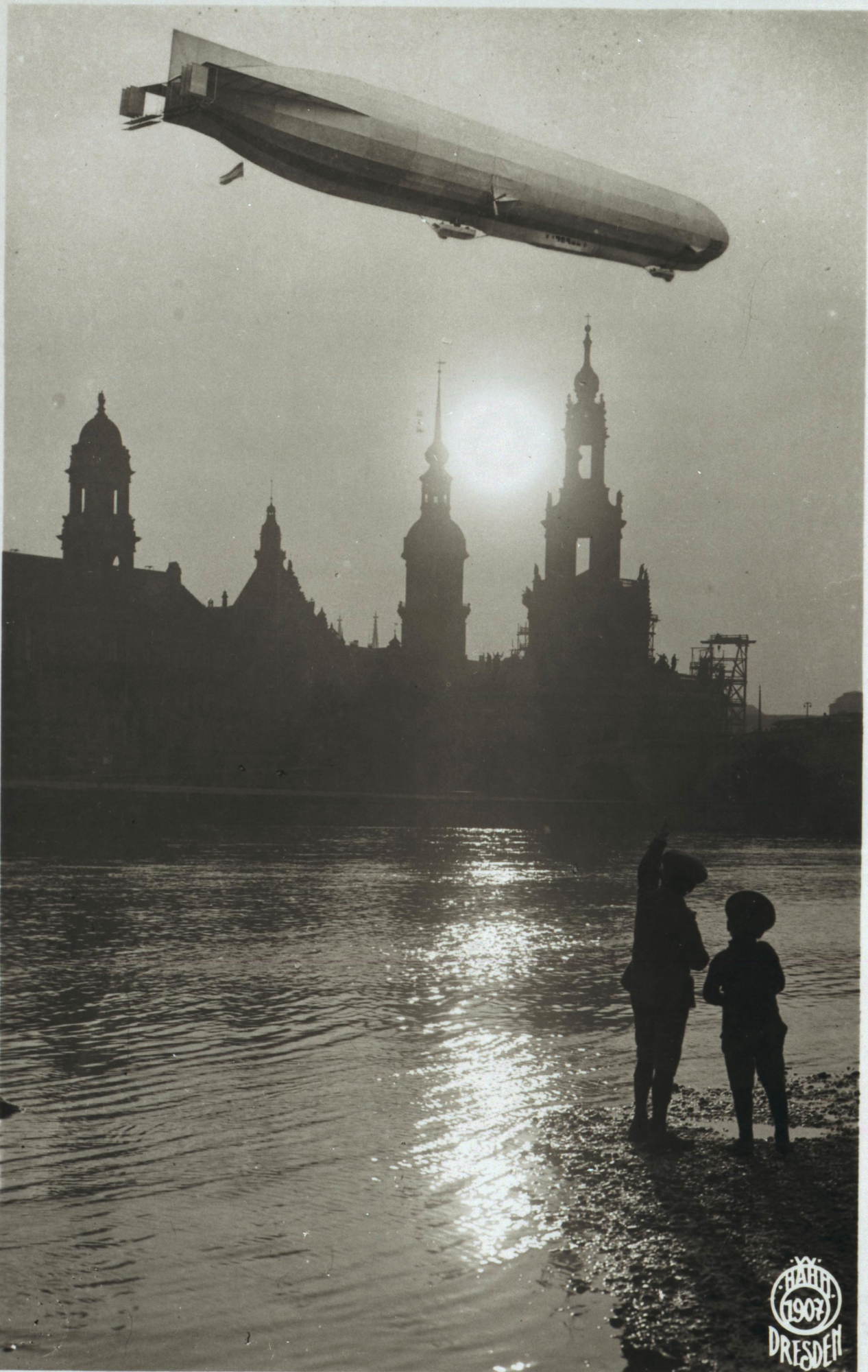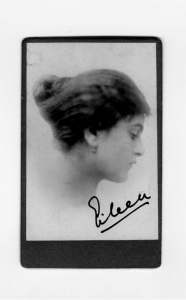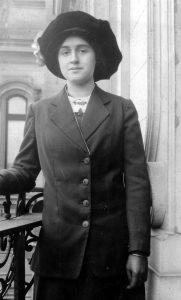Written for the Verkehrsmuseum, Dresden
Eva-Marie Kröller
She would “give worlds to be [back in Dresden,] absolute worlds,” Eileen Plunket wrote to her friend Beulah Knox in December 1913 after both of them had left the exclusive girls’ boarding school of the Misses von Gruber on Eisenstuckstrasse in Dresden. Beulah, future wife of the anthropologist T.F. McIlwraith, travelled throughout Europe during 1913 and 1914 with the family of her cousin, T.F.’s best friend Philip Child. The Childs spent extended periods in Dresden and Lausanne to enable the “children” to improve their knowledge of German and French, and they also studied Spanish to be prepared for their tour of Spain. In Dresden especially, Beulah was exposed to the city’s vibrant mix of tradition and modernity before the First World War.
Despite her longing for the companionship at the Pensionat after she had left it, Eileen did her best to be as objectionable a student as she could possibly manage while she was there. Her cousin Doris Blackwood, somewhat better behaved, also attended. Both were the granddaughters of the Marquess of Dufferin and Ava, former governor-general of Canada. Eileen’s father, William Plunket, had served as Governor of New Zealand from 1904 to 1910, and the interest of the NZ press in the family’s activities remained strong even after they had left: much information on Eileen’s family may be located through NZ’s Papers Past collection. The same is true for the life of Doris Blackwood, who accompanied Ronald Munro Ferguson, 1st Viscount Novar, and his wife Helen (Doris’s aunt) to Australia when he was appointed Governor General in 1914. When war broke out, Doris was trapped in Australia for the duration, and the Australian Press – as collected in the Trove database – faithfully followed her every move whether it was in the war effort or as social butterfly.
Eileen and Doris also counted the satirist and politician Richard Brinsley Sheridan among their ancestors, and – as Andrew Gailey relates in The Lost Imperialist: Lord Dufferin, Memory and Mythmaking in an Age of Celebrity (2015) – his influence is said to have created a tradition of bad language especially among the family’s women, including Eileen. Once the war got underway, she described her German fellow students as “dirty pigs!” and, to make her feelings amply known, underlined “pigs” three times. However, people on her own side did not fare much better. As recorded in his diary, Lieutenant Colonel Mackesy listened to her, aghast, as she addressed a fellow passenger on the Remuera with “You dirty lousy old man”: “Glad I have no daughters,” Mackesy concluded – as well he might. Eileen’s irreverence and spunk did, however, serve her well as an ambulance driver for the all-female Hackett-Lowther unit in France. Although she married Captain Rowland Lionel Barnard in her thirties and had two children with him, she appears to have discovered or confirmed her attraction to women while serving in the unit, and Una Troubridge’s diaries have her arrive with a female companion at parties also attended by Toupie Lowther, Troubridge, Radclyffe Hall, Nellie Rowe and Romaine Brooks.
Keenly interested in her fellow students who came from the aristocracy and moneyed classes all over Europe, Beulah kept up a lengthy correspondence, complicated by the war, with girls in Britain, Germany, and Norway, but she was not intimidated by the many baronesses and insisted that to be “really exclusive,” one had to be “Miss.” Her refusal to be star-struck is a notable feature of her letters home to her family in Painesville, OH. Although she and the Childs kept up a formidable program of opera going that included all of Wagner’s Ring cycle, she did not share her fellow students’ Schwärmerei for the stars that had Eileen slip the baritone Waldemar Staegemann an amorous letter and other students, even normally level-headed ones, go into raptures over tenor Fritz Vogelstrom’s “ripping” legs. Much as she enjoyed the opera, Beulah’s preference was to balance these highbrow performances with popular entertainment such as tango teas, the cinema, automobile shows. She did not care for exhibitions of modern painting, but was intrigued by modern dance as practiced by a fellow student who had studied with Isadora Duncan, doing “all kinds of little hops + runs + walks.” With regular air service established between Leipzig and Dresden, the spectacle of Zeppelins travelling overhead was a frequent excuse for the girls to interrupt their studies and run to the window. For inclusion in Writing the Empire: The McIlwraiths, 1853-1948, Dresden’s Museum of Transport provided a photo – probably a composite – of a Zeppelin passing over the city’s baroque silhouette.
Eileen disrespectfully referred to the Misses von Gruber as “the Grubs,” but without knowing about it, Beulah and her fellow students were being taught by women who came from a German family of distinguished educators, academics and scientists. Their descendants in Germany and the United States along with Germany’s federal archive (the Bundesarchiv) and various city archives confirmed that the careers of the Grubers and the Kromayers, to whom they were related by marriage, took them all over the expanding Wilhelmine empire and also into Ottoman territory. With their international clientele gone and their teaching staff forced to return to their countries of origin, however, the von Grubers’ Pensionat folded a few months into the war.
Worse was to come when, in the next generation, an ancestor from Izmir and Jewish family members attracted the attention of Nazi Germany’s racial police, as did evidence of leftist politics. Emigration was the only way for several members of the family to save themselves. Heinrich Kromayer’s memoir for Harvard University’s contest “My Life in Germany before and after January 30, 1933,” held at Harvard’s Houghton Library, depicts the alarming situation that compelled his family to leave.
With thanks to the Verkehrsmuseum Dresden and to Professor T.F. McIlwraith for permission to reproduce photos.


